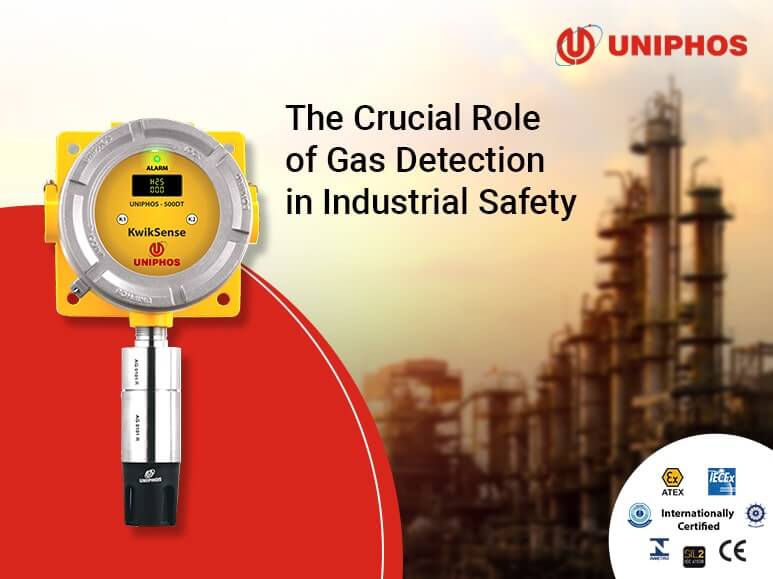In industries where hazardous gases are present, the margin for error is small.
Failure to address and manage hazardous gases can result in catastrophic consequences. Neglecting proper protocols to control or mitigate the release of hazardous gases may lead to environmental pollution, health hazards, and potential accidents.
So, how can we ensure a safe working environment in industries dealing with hazardous gases? To solve this problem, gas detection is a reliable solution. Gas detectors play a critical role in maintaining safety in various industrial environments.
In this blog, we aim to highlight the importance of gas detection systems and how they contribute to preventing accidents and ensuring industrial safety. So, let’s get started.
Understanding Gas Detection
Gas detection refers to the process of identifying potentially hazardous gases in the environment. In industrial settings, various gases can pose risks, including flammable, toxic, or oxygen-depleting gases. Gas detection systems are designed to alert workers when gas levels become unsafe, allowing for immediate action to reduce risks.
The Importance of Gas Detection in Industrial Safety
- Early Warning Signs
Gas detection systems are designed to detect the presence of hazardous gases in the air, providing an instant alert to workers and allowing them to take immediate action. This early warning is crucial in preventing the escalation of potentially dangerous situations.
- Accident Prevention
By providing early alerts, gas detection helps prevent accidents. Timely identification of gas leaks enables workers and safety personnel to take prompt action, such as initiating evacuation procedures or implementing safety measures to mitigate the risks associated with the presence of harmful gases.
- Protecting Workers’ Health
Single and multi-gas detectors are essential for safeguarding the health of workers. Exposure to toxic gases can have severe health consequences. Gas detection systems ensure that workers are promptly informed of any potential threats, allowing them to take necessary precautions and avoid exposure.
- Asset Protection
The potential consequences of gas-related incidents, such as explosions, fires, and corrosion, can impose substantial damage on infrastructure, equipment, and valuable assets. Undetected gas leaks not only pose a threat to safety but can also result in expensive repairs, prolonged downtime, and, in extreme cases, the complete loss of assets. By deploying reliable gas detection systems, you can proactively mitigate these risks, ensuring the protection of investments and the continuity of operations.
- Regulatory Compliance
Many regulatory bodies require the implementation of gas detection as a fundamental safety measure. Compliance not only avoids legal issues but also demonstrates a commitment to creating a secure working environment. Industries are bound by various safety standards and regulations, such as those set by the Occupational Safety and Health Administration (OSHA) and the Environmental Protection Agency (EPA).
- Cost-effective Safety Measure
Implementing gas detection is a cost-effective safety measure in the long run. The expenses associated with accidents, health issues, and environmental damage far outweigh the initial investment in a reliable gas detection system. It is a proactive approach that saves both lives and resources.
Implementing a Comprehensive Gas Detection Strategy
- Risk Assessment: Conducting a thorough risk assessment to identify potential gas hazards is the first step toward implementing an effective gas detection strategy.
- Selection of Appropriate Detectors: It is essential to choose the right detectors, like single-gas or multi-gas detectors, that are altered to the specific types of gases and environmental conditions of the workplace.
- Training and Awareness: Ensuring that all employees are adequately trained on using gas detection equipment and emergency procedures is crucial.
- Maintenance and Calibration: Regular maintenance and calibration of gas detection equipment ensure accuracy and reliability.
- Emergency Preparedness: Developing and practicing an emergency response plan that includes evacuation routes and communication protocols is vital.
Closing Note
When we talk about harmful gases present around us, it is always better to be safe than sorry. Implementing a robust gas detection system is not just a precaution but a commitment to the well-being of workers, the environment, and the continuous operation of industrial operations.
If you need reliable gas detection systems, Uniphos can help you navigate towards a safer surrounding. With their expertise and cutting-edge technology, Uniphos ensures peace of mind, allowing you to focus on productivity while prioritizing safety. Choose Uniphos for a secure and proactive approach to industrial gas detection.
Need more insights regarding our gas detection systems? Visit our website today!




